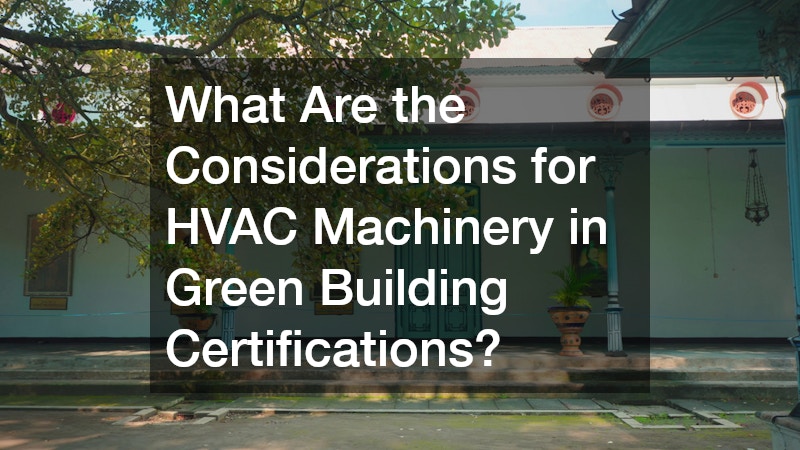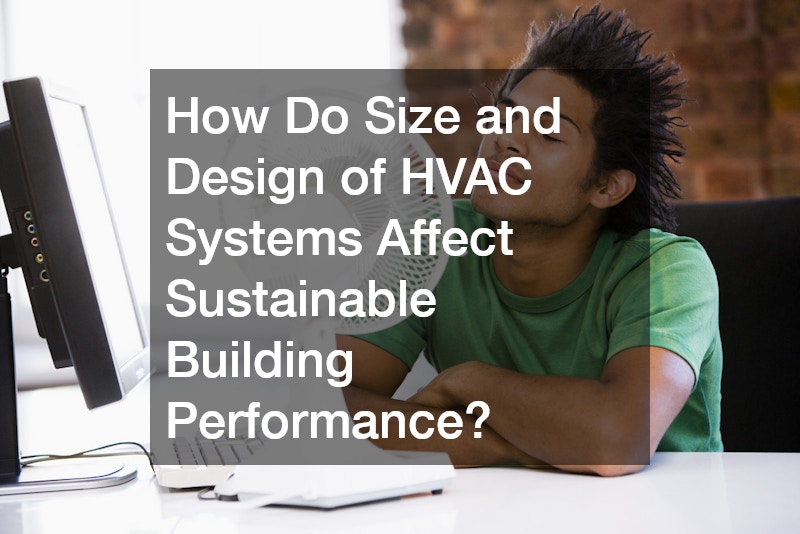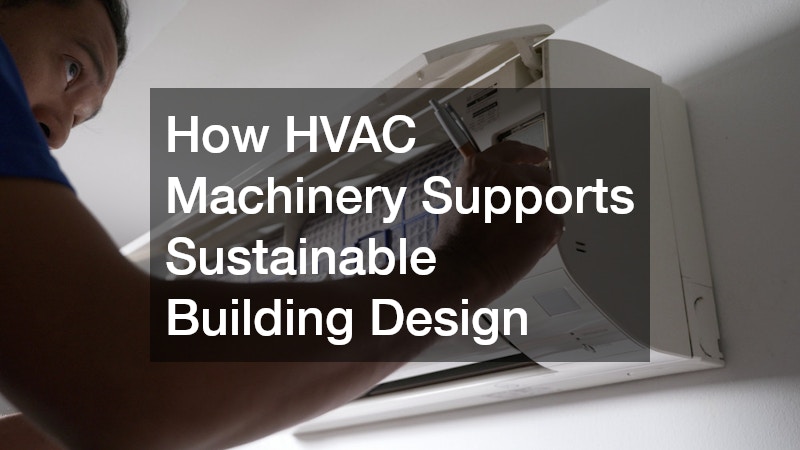Understanding the role of HVAC (Heating, Ventilation, and Air Conditioning) machinery in sustainable building design is essential for achieving optimal energy efficiency and maintaining high indoor climate quality. Sustainable building design seeks to reduce environmental impact while maximizing comfort for occupants, blending innovation with responsibility to create structures that meet modern performance standards. Advanced HVAC machinery plays a pivotal role in this process, serving as both a comfort provider and an energy management tool. By integrating cutting-edge systems, builders and property owners can create spaces that balance energy consumption with indoor comfort, enhancing long-term building performance. Whether installed by experienced heating repair companies, a trusted HVAC company, or a specialized AC company, these systems form the backbone of eco-friendly architecture. Today’s sustainable buildings also rely on services like HVAC installation, water heater services, and mobile home air conditioning to maintain efficiency and reliability. As environmental regulations tighten and public awareness grows, the demand for energy-smart heating and cooling solutions is accelerating. This evolution is not only lowering operational costs for building owners but also driving the development of innovative technologies that support a greener future for residential, commercial, and industrial spaces alike.
1. What is the Role of HVAC Machinery in Sustainable Design?

HVAC machinery plays a critical role in sustainable design by managing heating, cooling, and ventilation in a way that minimizes energy usage and environmental impact. These systems ensure a consistent indoor climate, preventing excessive use of energy for temperature control. A skilled HVAC contractor can recommend the best system for a particular building, considering factors such as insulation, window placement, and occupancy patterns. The integration of water heater services into overall HVAC planning also ensures that hot water needs are met efficiently, further supporting a sustainable approach.
In many sustainable projects, local AC contractors collaborate with architects and engineers to ensure HVAC systems are not oversized or undersized, reducing energy waste. HVAC installation is tailored to meet specific green building goals, such as lowering carbon emissions and improving overall energy ratings. The ability to design systems with low-impact refrigerants, high-efficiency motors, and renewable energy compatibility means heating repair companies can be proactive partners in environmental stewardship while still meeting comfort requirements.
2. How Does Energy Efficiency in HVAC Systems Impact Sustainability?
Energy efficiency in HVAC systems directly affects a building’s sustainability. High-efficiency equipment reduces the amount of fuel or electricity needed to achieve the desired indoor temperature, cutting down greenhouse gas emissions. Heating services and cooling systems equipped with variable-speed motors, advanced compressors, and programmable controls use only the energy necessary at any given moment, unlike older, fixed-speed models. This precise operation significantly lowers wasted energy and reduces strain on the electrical grid.
An HVAC company that specializes in sustainable design can recommend systems with high Seasonal Energy Efficiency Ratio (SEER) ratings and Annual Fuel Utilization Efficiency (AFUE) ratings. By working with heating repair companies that understand eco-friendly goals, building owners can extend system lifespan and reduce the need for frequent replacements, which saves both resources and money. Incorporating water heater services that utilize energy-efficient tankless systems or heat pump technology further amplifies these benefits. Partnering with an AC company that offers energy audits can also help identify hidden inefficiencies in an existing setup.
3. What Advances in HVAC Technology Are Driving Green Building Practices?
Recent advances in HVAC technology have significantly boosted green building practices. Innovations such as geothermal heat pumps, energy recovery ventilators, and ductless mini-splits have become popular for their efficiency and low environmental impact. Smart thermostats and zoning systems allow for precise temperature control, ensuring energy is not wasted in unoccupied areas. These improvements are supported by manufacturing advances, including better heat exchanger designs and more environmentally friendly refrigerants.
Another important advancement is in mobile home air conditioning systems, which are now designed to be more energy-efficient and compact, reducing the carbon footprint of smaller living spaces. An AC company offering state-of-the-art mobile home air conditioning solutions can make even compact homes align with sustainable principles. Many HVAC installation specialists are also incorporating building automation technology that integrates HVAC with lighting and security systems, maximizing overall energy savings. Heating services are now increasingly designed with modularity in mind, allowing future upgrades without replacing entire systems.
4. How Do HVAC Systems Contribute to Indoor Air Quality and Health?

Indoor air quality is a key component of sustainable building design because it directly impacts occupant health and productivity. HVAC systems that are properly designed and maintained can filter out dust, allergens, and pollutants, ensuring fresh air circulation. This is particularly important in urban environments where outdoor air quality may be compromised. Sustainable HVAC designs focus on adequate ventilation rates and moisture control to prevent mold growth and other indoor pollutants.
Heating services and AC service providers now integrate high-efficiency particulate air (HEPA) filters, UV light sterilization, and humidity control systems to enhance air quality. Working with local AC contractors who understand indoor air quality standards ensures that systems meet or exceed environmental health guidelines. Regular HVAC maintenance prevents mold growth, reduces allergens, and maintains a comfortable, healthy indoor climate. Heating repair companies also advise on incorporating air purification units into HVAC systems, which can be particularly beneficial in areas with seasonal wildfire smoke or industrial emissions.
5. What Are the Benefits of Using Renewable Energy Sources in HVAC Machinery?
Incorporating renewable energy sources into HVAC machinery further enhances sustainability. Solar-assisted heating systems, for example, can reduce reliance on fossil fuels, while geothermal systems use the earth’s stable temperature to heat and cool buildings with minimal energy input. A forward-thinking HVAC contractor may recommend hybrid systems that combine traditional and renewable energy sources to maximize efficiency and minimize costs, especially for large commercial or multi-family residential buildings.
Heating repair companies and HVAC installation professionals are increasingly trained to work with renewable systems, ensuring they are properly integrated into existing infrastructure. Water heater services can also incorporate solar heating technology, reducing the need for conventional power sources for domestic hot water. By sourcing clean energy, an AC company can help clients significantly reduce their carbon footprint. Additionally, renewable-powered mobile home air conditioning units are emerging as an affordable, sustainable option for manufactured home communities.
6. How Can Smart HVAC Systems Foster Energy Conservation?
Smart HVAC systems are a game changer in the realm of sustainable building design. Using advanced sensors, automated controls, and AI-driven analytics, these systems adapt to occupancy patterns, weather conditions, and user preferences to optimize performance. This real-time adaptability ensures that energy is used only when and where it is needed, providing measurable reductions in operating costs and environmental impact.
Many local AC contractors and AC service providers now offer smart upgrades, such as Wi-Fi-enabled thermostats and app-controlled zoning systems. These tools empower building owners and occupants to monitor and adjust system performance remotely, preventing energy waste and lowering utility bills. Heating services and water heater services are also increasingly integrated into smart home platforms, enabling property managers to receive maintenance alerts before costly breakdowns occur. Heating repair companies benefit too, as predictive maintenance allows for planned service visits rather than emergency calls, reducing fuel use and scheduling inefficiencies.
7. What Are the Considerations for HVAC Machinery in Green Building Certifications?

Green building certifications such as LEED, WELL, and ENERGY STAR place a strong emphasis on HVAC performance. To qualify, systems must meet stringent energy efficiency, air quality, and environmental impact criteria. An HVAC company with experience in certification standards can design and install systems that align with these benchmarks, ensuring compliance from the initial planning phase through final inspection.
Heating repair companies and HVAC installation professionals can ensure compliance by using equipment with high efficiency ratings, environmentally friendly refrigerants, and advanced control systems. Integrating water heater services and mobile home air conditioning into the overall building plan can further enhance a project’s sustainability profile and certification potential. AC company teams often collaborate with architects to document HVAC performance metrics, which is critical for certification submissions. Local AC contractors may also provide post-installation monitoring to maintain certification standards over time.
8. How Does Proper HVAC Maintenance Enhance Sustainability?
Even the most advanced HVAC machinery can lose efficiency if not properly maintained. Regular maintenance, including filter changes, coil cleaning, and duct inspections, helps maintain peak performance and extend system life. Proper maintenance also prevents costly breakdowns, which can lead to emergency repairs and higher environmental impact due to the need for expedited shipping of replacement parts or additional technician travel.
Heating repair companies and AC service providers play a crucial role here. By scheduling seasonal tune-ups and inspections with a trusted HVAC contractor, building owners can avoid energy waste and maintain optimal indoor air quality. Water heater services should also be included in maintenance schedules to ensure consistent efficiency and performance. Many HVAC installation companies now offer maintenance packages that include energy efficiency checks, refrigerant level monitoring, and smart system updates to keep sustainable designs performing as intended.
9. What Innovations Are Expected in the Future of HVAC for Sustainable Buildings?
The future of HVAC is set to bring even more innovative solutions for sustainable buildings. Emerging trends include AI-driven predictive maintenance, advanced heat exchange materials, and systems capable of integrating seamlessly with renewable energy grids. Mobile home air conditioning units are also expected to become more efficient and adaptable, providing affordable, eco-friendly climate control for smaller residences and temporary housing solutions.
Forward-thinking HVAC installation companies and local AC contractors are already experimenting with these technologies. Heating services will continue to evolve to include renewable heat sources, while AC company offerings will focus on eco-friendly refrigerants and zero-energy cooling systems. Heating repair companies may shift toward retrofitting older systems with new components that boost efficiency, extending the useful life of existing infrastructure while minimizing waste. Water heater services could soon feature integrated thermal storage, enabling buildings to use excess renewable energy generated during off-peak hours.
10. How Do Size and Design of HVAC Systems Affect Sustainable Building Performance?

Proper sizing and design of HVAC systems are critical for sustainability. Oversized systems can lead to short cycling, wasted energy, and unnecessary wear, while undersized systems struggle to maintain comfort, leading to higher energy usage and occupant dissatisfaction. An experienced HVAC contractor uses detailed load calculations to determine the ideal size for each building, factoring in insulation levels, window types, and expected occupancy.
In sustainable building design, heating repair companies and HVAC installation professionals work closely with architects to ensure equipment placement and ductwork design support energy efficiency. This collaboration is especially important for mobile home air conditioning systems, where space constraints require careful planning to maintain both efficiency and occupant comfort. AC service providers may recommend ductless mini-splits or compact air handlers in these cases. Water heater services must also be sized appropriately to avoid energy waste, further contributing to a building’s overall sustainability goals.
HVAC machinery plays a pivotal role in supporting sustainable building design by enhancing energy efficiency, integrating renewable energy, and improving indoor air quality. These systems are no longer just mechanical necessities—they are strategic components in achieving long-term environmental goals. From heating repair companies to specialized AC company services, the industry continues to innovate, delivering solutions that align with green building principles while meeting the comfort demands of modern occupants. Local AC contractors, HVAC installation experts, and providers of heating services and water heater services are essential partners in this journey, ensuring that each unit is designed, installed, and maintained for peak performance and minimal environmental impact.
As emerging technologies reshape the HVAC landscape, from mobile home air conditioning advancements to AI-powered energy management tools, the potential for reducing carbon footprints and operational costs is greater than ever. These innovations not only improve performance but also make sustainable options more accessible to homeowners, businesses, and property developers. By collaborating with experienced HVAC company teams and prioritizing long-term efficiency over short-term fixes, building owners can ensure that their investments provide consistent comfort, reduce environmental strain, and maintain compliance with evolving green building standards. Ultimately, HVAC systems will remain a cornerstone in the global shift toward environmentally responsible living and working spaces—serving as both a practical necessity and a powerful driver for a cleaner, more sustainable future.

